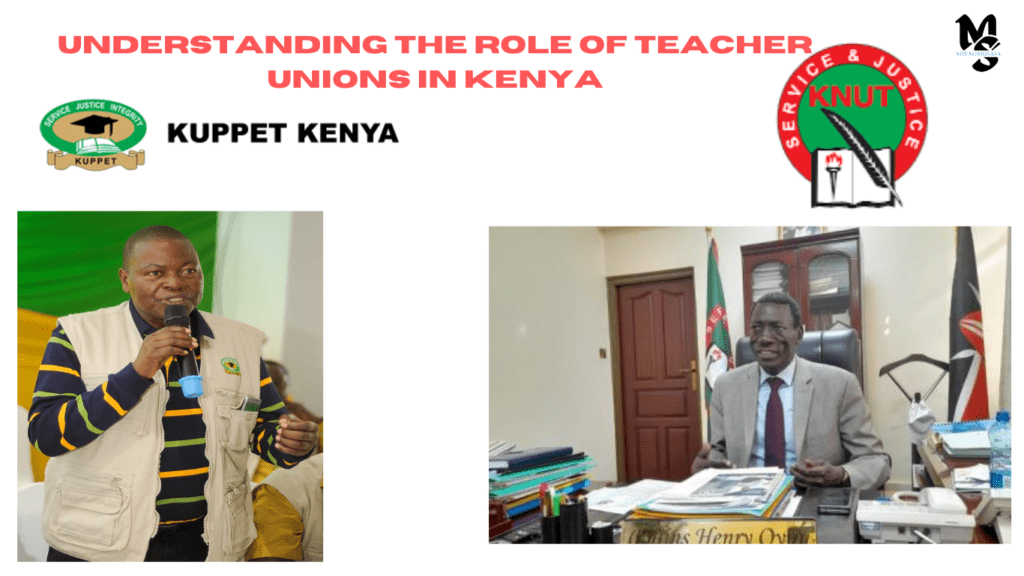Understanding the Role of Teacher Unions in Kenya: An Exploration of KNUT and KUPPET

A picture of current leaders of KUPPET and KNUT

Introduction
Teacher unions play a critical role in advocating for the rights and welfare of educators across the globe. These organizations not only serve as a collective voice for teachers but also engage actively in negotiating for better working conditions, salaries, and benefits. Globally, teacher unions have been pivotal in shaping educational policies, ensuring that the concerns of educators are adequately addressed within the government and education frameworks.
In Kenya, two prominent unions stand out in the landscape of education: the Kenya National Union of Teachers (KNUT) and the Kenya Union of Post Primary Education Teachers (KUPPET). KNUT primarily represents teachers in primary education, while KUPPET focuses on the post-primary level, including secondary teachers. Both unions have been instrumental in advocating for policies that impact teachers and, consequently, the quality of education in the country. Their influence extends beyond mere representation; they also play a crucial role in the political impact in education by engaging with the government on various educational reforms and issues affecting teachers.
The purpose of this article is to delve into the essential roles and functions that KNUT and KUPPET serve in the Kenyan education system. We will explore how these unions contribute to the professional development of educators, their involvement in political advocacy, and their efforts in creating a conducive teaching environment in both primary and secondary education. Understanding the dynamics of these unions will provide insight into the broader impact they have on the quality of education in Kenya, as well as the ongoing challenges faced by educators. Through this exploration, we aim to highlight the significance of teacher unions in fostering an equitable educational landscape for both teachers and students alike.
Overview of KNUT and KUPPET

The Kenya National Union of Teachers (KNUT) and the Kenya Union of Post-Primary Education Teachers (KUPPET) are two significant teacher unions within the education sector of Kenya, each playing a crucial role in advocating for the rights and welfare of educators. KNUT was founded in 1957 with the primary objective of addressing the needs of primary teachers. The union has been instrumental in negotiating better salaries and working conditions for its members, striving to influence government policies affecting education. Over the years, KNUT has been pivotal in organizing strikes and protests that have resulted in substantial victories for primary teachers, establishing it as a formidable entity in both the education system and the political landscape of Kenya.

KUPPET, on the other hand, emerged in 1998, primarily catering to secondary school teachers. Its formation was a response to the need for a union focused specifically on the unique challenges faced by secondary educators. While KUPPET shares objectives similar to those of KNUT in terms of advocating for better conditions and salaries, its focus on secondary teachers allows it to tailor its strategies and goals accordingly. Notably, KUPPET has championed issues such as curriculum development and the professional development of secondary teachers, which are vital for enhancing the quality of education in Kenya.
There are key structural differences between KNUT and KUPPET. KNUT operates under a more centralized system with a more considerable historical influence on primary education policies, while KUPPET tends to adopt a more decentralized approach that encourages regional representation. Additionally, the areas of focus diverge; while KNUT often concentrates on collective bargaining for primary teachers, KUPPET also engages in broader educational advocacy, including political engagement regarding the impact of government policies on education. Ultimately, both unions play complementary roles within the framework of teacher advocacy in Kenya, contributing significantly to the discourse surrounding education equity and political impact in education.
Advocacy for Teachers’ Rights
The advocacy for teachers’ rights in Kenya has been significantly shaped by two major unions: the Kenya National Union of Teachers (KNUT) and the Kenya Union of Post-Primary Education Teachers (KUPPET). These organizations play a critical role in representing the interests of primary and secondary teachers, engaging in salary negotiations, and advocating for improved working conditions through collective bargaining agreements (CBAs). Recent CBAs have brought to light specific advancements in teachers’ welfare, allowing unions to articulate and negotiate on behalf of their members effectively.
For instance, the renegotiation of salaries has been a fundamental aspect of the unions’ advocacy efforts. With rising living costs and inflation, KUPPET and KNUT have been instrumental in initiating dialogue with the government and the Teachers Service Commission (TSC) for better remuneration. These negotiations have not only aimed at securing a more equitable salary structure but also facilitating additional benefits that contribute to the overall welfare of teachers. The impact of these agreements has been marked by an increased commitment to job security, which remains a paramount concern for educators across the nation.
Both unions also provide legal protection for teachers, ensuring their rights are upheld amidst various challenges in the education sector. This includes addressing issues related to teacher misconduct, dismissal, and ensuring due process is followed during disciplinary actions. Furthermore, the roles that KNUT and KUPPET play in promoting favorable conditions for career advancement within TSC underscore their commitment to enhancing job security and professional growth for teachers. Through various initiatives and campaigns, they champion policies that not only advocate for fair treatment but also emphasize the importance of maintaining a strong teaching workforce essential for the nation’s education system.
Union Activities Beyond Salaries
Teacher unions in Kenya, primarily the Kenya National Union of Teachers (KNUT) and the Kenya Union of Post-Primary Education Teachers (KUPPET), play vital roles that extend well beyond salary negotiations. While salary advocacy is often the most visible activity of these unions, their influence permeates various aspects of the educational framework provided to both primary teachers and secondary teachers. These organizations actively engage in the professional development of educators, ensuring that they remain current with educational policies and pedagogical advancements.
Both KNUT and KUPPET facilitate workshops, seminars, and training sessions aimed at enhancing the skills of teachers. This commitment to professional development is instrumental in ensuring that educators deliver quality education, which ultimately benefits the learners. The unions also advocate for teachers’ rights, ensuring that the voices of both primary and secondary teachers are heard at the government level, which directly influences education policy. Through continuous dialogue with policymakers, these unions contribute significantly to shaping the standards of education in Kenya, making it imperative for government and education initiatives to align with the needs of educators.
Moreover, the unions embark on various welfare and social programs aimed at improving the livelihoods of their members. Initiatives such as housing schemes and medical insurance options are offered to assist teachers in managing their personal and professional challenges. The collective bargaining agreements reached by KNUT and KUPPET not only address financial remuneration but also include provisions for these essential services that enhance the overall well-being of teachers. This multi-faceted approach to union activities showcases their vital role in promoting not only the financial interests of educators but also their social welfare, thus reinforcing the political impact in education across Kenya. Teachers are empowered when they have access to adequate resources, further enabling them to fulfill their responsibilities effectively.
Challenges Faced by Teacher Unions
Teacher unions in Kenya, primarily the Kenya National Union of Teachers (KNUT) and the Kenya Union of Post Primary Education Teachers (KUPPET), play a pivotal role in advocating for the rights and welfare of educators. However, these unions face a myriad of challenges that undermine their effectiveness and impact. One significant challenge is political interference, where government entities exert pressure on unions, attempting to influence who leads these organizations. Such interference can stifle the unions’ ability to represent teachers’ interests without bias, leading to a sense of disillusionment among members.
Additionally, internal conflicts within union leadership contribute to inefficiencies. Disagreements over leadership styles, vision, and strategies often polarize members. This discord can result in factions emerging within the unions, diverting focus from the primary goal of improving conditions for primary teachers and secondary teachers alike. Furthermore, disillusionment with the union leadership has been a contributing factor to a decline in membership. Many educators have become skeptical of the ability of their unions to negotiate effectively with the Teachers Service Commission (TSC), particularly when there are direct dealings between the TSC and individual teachers that bypass the unions.
The complexity of negotiating with the government poses another challenge that these unions must navigate. Balancing the interests of their members with government policies can be precarious. Often, unions are pressured to align their demands with budgetary constraints and political agendas set by the government. Such dynamics can lead unions to compromise on critical issues, leaving teachers feeling that their needs and rights are inadequately protected. The ability of KNUT and KUPPET to persist in advocating for educators’ benefits amidst these challenges is crucial for ensuring that teachers maintain a united front in addressing their concerns.
How Educators Can Engage with Teacher Unions
Joining teacher unions such as the Kenya National Union of Teachers (KNUT) and the Kenya Union of Post-Primary Education Teachers (KUPPET) offers numerous advantages to educators. These organizations serve as fundamental support systems, providing members with legal aid, resources, and a collective voice in discussions surrounding government policies affecting education. By becoming a member, educators can gain access to various benefits that may significantly enhance their professional and personal lives. For instance, legal support can help teachers navigate any disputes related to employment or working conditions, ensuring they receive fair treatment.
In addition to securing legal aid, engaging with KNUT or KUPPET enables educators to actively participate in decision-making processes that impact their profession. Teachers can engage by attending regular meetings, which often serve as platforms for discussing prevailing issues in the education sector, political impacts in education, and identifying strategies for improvement. Active participation aids several objectives, including influencing policies that govern the educational landscape in Kenya and voicing concerns that resonate within the broader teaching community.
Understanding the mechanics of union dues is vital for educators aspiring to participate in union activities effectively. These dues are typically a small percentage of a teacher’s salary, contributing to the financial stability and operational efficiency of the union. It is crucial for educators to maintain their financial obligations, as a robust membership base strengthens collective bargaining. Consequently, timely contributions ensure that unions can advocate effectively for improved working conditions and educational funding from the government. By fostering a culture of participation and mutual support, educators can develop a unified front that prioritizes their rights and the advancement of the education sector as a whole.
Conclusion
In examining the vital role of teacher unions in Kenya, specifically the Kenya National Union of Teachers (KNUT) and the Kenya Union of Post-Primary Education Teachers (KUPPET), it becomes evident that these organizations serve as crucial advocates for educational professionals. Both KNUT and KUPPET play significant roles in protecting the rights of primary and secondary teachers by negotiating better pay, benefits, and working conditions. Their influence extends beyond mere labor rights, encompassing broader political impacts in education that align with the government’s educational policies.
Teacher unions stand as a united front, ensuring that the voices of educators are heard, particularly in a landscape where government decisions can greatly impact education systems. The political dynamics surrounding education in Kenya requires constant engagement from educators, and unions like KNUT and KUPPET provide the necessary platforms for collaboration and dialogue. This engagement not only enhances teachers’ professional growth but also cultivates a strong sense of community among educators, empowering them to advocate for their rights and the welfare of their students.
As Kenya continues to navigate the complexities of educational reform, it is paramount for teachers to remain informed and actively involved in union activities. Participation in these unions is essential for nurturing a professional environment conducive to teaching and learning, where educators understand their rights and responsibilities. Thus, it is crucial for teachers, whether in primary or secondary settings, to leverage the benefits of their unions to shape a brighter future for their profession. By coming together, teachers can ensure their collective voices resonate, thus safeguarding their rights and advancing the educational landscape. Engaging with KNUT and KUPPET is not just beneficial, it is necessary for every teacher committed to their profession and the students they serve.




